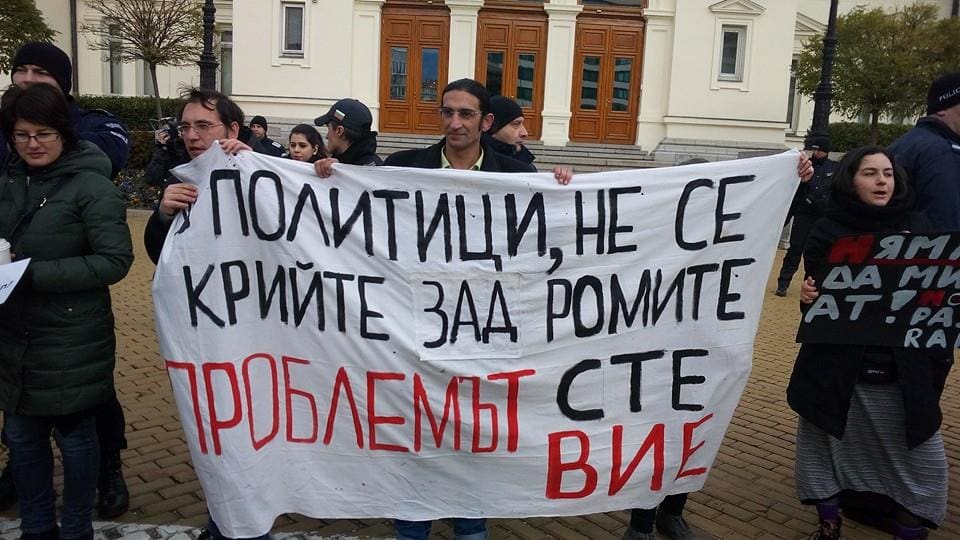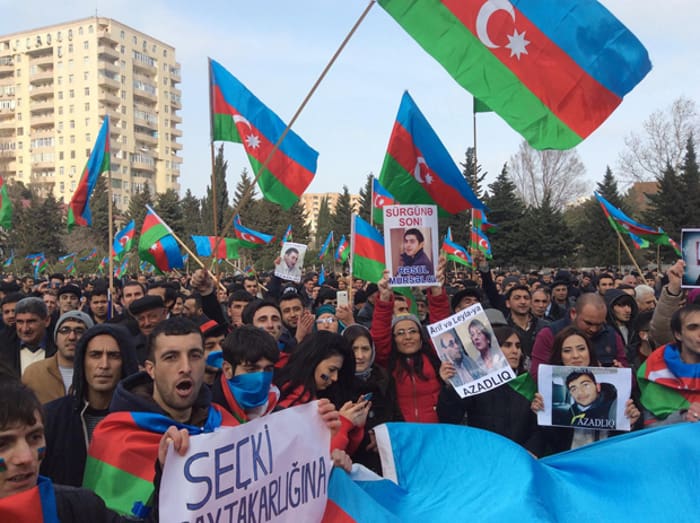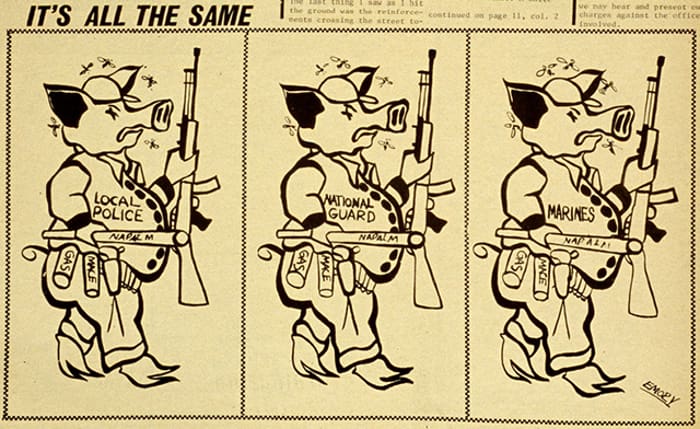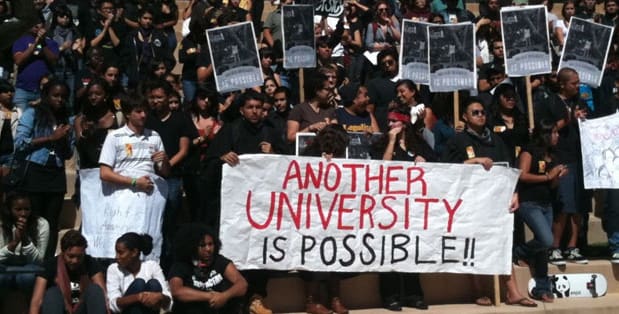Transcribed from the 24 January 2015 episode of This is Hell! Radio and printed with permission. Edited for space and readability. Listen to the whole interview:
“Roma are among the poorest citizens in Bulgaria. But somehow, paradoxically, they are considered the most privileged, because of their supposed “privileged” access to welfare.”
Chuck Mertz: We’ve been discussing neoliberalism, austerity and race on This is Hell! for a while now. But what happens when austerity actually fuels more racism? Here to tell us what austerity means for racism against Bulgaria’s Roma: Jana Tsoneva.
Good morning, Jana.
Jana Tsoneva: Good morning.
CM: Jana is a Ph.D. student in sociology in Budapest. Her research interests focus on the history of ideas, political economy, and theory of ideology. She is a member of the social center Xaspel, a first-of-its-kind social center in Sofia set up as a place of solidarity for collective actions. Jana recently wrote the first and third parts of the three-part story Bulgaria’s Creeping Apartheid, which appeared at the LeftEast section of CriticAtac.ro.
I don’t want to conflate a race or ethnic group with poverty. But is Bulgaria trying to socially engineer, through austerity, the end of the Roma lifestyle? The end of the Roma culture?
JT: Well, no. But let me first address your opening sentence. Sometimes poverty and ethnic identity do overlap. Not all Roma are poor, for example, but in Bulgaria the majority of the Roma population does happen to be poor. What happens in the case of austerity politics is their image as a poor parasite on welfare can be very easily mobilized in order to shrink the social state, to convince the public that “those” people don’t work and don’t deserve services, so we should cut welfare.
And it works. People tend to get convinced easily, and they accept cuts which also affect them negatively, of course. Unfortunately the image of the unproductive parasite is too powerful, and it’s very difficult to counter.
CM: Here in the United States, obviously, we are very experienced in racism. We started the country on slavery; you see the racist policies that we have towards non-whites in this country. But racism is experienced differently in different places around the world. How would you describe the kind of everyday racism that the Roma in Bulgaria experience?
JT: They live almost completely segregated. They have their own ghettoes. They have very little access to jobs. Also, parallel to the United States, the majority of the incarcerated population tends to be Roma. The legal system punishes them disproportionately and more severely than everybody else. Lack of access to education, to opportunity. It’s just difficult.
I don’t see such great differences. Maybe there are differences, but there are many common points between what the Roma population experiences in Bulgaria and what the African-American population experiences in the US.
CM: Whenever I hear discussions about the Roma, I am very quick to be critical of anybody who has anti-Roma feelings, because my great-grandmother was Roma. But when I talk to people who have been in areas where Roma live, they always say I just don’t understand because I haven’t experienced firsthand what the Roma culture is like. Which I have not. They always explain to me that the Roma shouldn’t be discriminated against, but they have a culture that is foreign to the rest of the area, and that leads to a lot of instability and insecurity.
It’s always the same argument. Yes, they shouldn’t be discriminated against, but they are such a “problem” within society. How should I react to this argument, when I haven’t had any experience with the Roma population?
JT: It’s exactly the same in Bulgaria. The Roma people are blamed for their own poverty, for their own marginalization. But the “Roma culture” that gets brought up is kind of a mystical culture, which for me doesn’t even exist. Because what is “Roma culture,” really? In Bulgaria, there are so many different Roma people. Sometimes they don’t even speak to each other. Some of them are Muslim, some of them are Christian; some of them have other defining characteristics which are completely different from the rest.
Moreover, I’m very suspicious whenever we have to start explaining problems with reference to the “victim” or characteristics that are attributed to the victim. It’s like asking a rape victim what she wore the night she was raped.
We shouldn’t blame the victim for their own poverty and marginalization. We should instead direct our critical attention to people who are voicing these ideas that it’s the Roma culture—or the Roma skin color, or whatever—that is to blame. It is the racists’ own pathology that should be critically scrutinized, and not the Roma culture.
Poverty and marginalization has nothing to do with Roma culture. These are issues which occur in every capitalist society simply because of the way capitalism works. Capitalism divides us into poor and rich, and that’s it. That’s not a culture problem. It’s a problem of political economy. This is what I would say to the people who tell you these things.
CM: You write in your piece that the austerity program the government is imposing on the people of Bulgaria actually leads to and feeds into racism against Roma people. How do austerity plans, economic policies, lead to more racism against Roma people?
JT: If the government wants to limit access to healthcare or education, or cut welfare spending, they know they can invoke this image we spoke about before, of the parasitic minority which is just taking without contributing—all the clichés—to make austerity more convincing. And they do. This is how austerity politics—an economic rationale which presents itself as a neutral, “realistic” approach to economic crisis—actually produces and feeds on stupid fantasies about marginalized people.
The racism towards Roma is functional to austerity. They are not the same thing, of course, but they can lock each other in this productive, symbiotic relationship and feed off of each other.
CM: There’s also an issue when it comes to Turks in Bulgaria. There was even a time when people with Turkish names had their names changed to Bulgarian names because there was so much racism towards Turks.
Do these austerity plans just target Roma people, or are they targeting everybody who is non-Bulgarian?
JT: They target everyone including Bulgarians. As we’ve said, social status and ethnicity can overlap in certain cases, but they are not the same thing. Poor Bulgarians will be negatively affected by the new round of austerity measures. But they can be convinced to accept what hurts them in the name of the struggle against the “bad Roma” or the “bad Turks” who are taking what should belong to “us,” and so on.
In this process, very strange fantasies begin to be produced. For example, Roma are among the poorest citizens in Bulgaria. But somehow, paradoxically, they are considered the most privileged, because of their supposed “privileged” access to welfare. Of course this is not true, but it is what people believe. And if we want to convince someone to accept cuts, we can tell them we’re taking from the ones who are really privileged.
Plainly, it’s not the Roma who are privileged. It is the rich. But this is how racism serves to displace the grievance towards those of real privilege and put it on a marginal and vulnerable minority. This is the process.
CM: Are the austerity measures that you see as being a measure of apartheid and racism towards Roma—are those being imposed by the troika? Is the troika endorsing, essentially, a racist policy?
JT: The troika would of course say they are not racist—and we can believe them, they are reasonable people and so on. But their policies can produce racism as an unintended consequence of ad hoc justifications for austerity.
But austerity in Bulgaria is sort of a special case. Bulgaria introduced austerity measures all the way back in 1997. We were way before Greece, Spain, Italy, and all the other European countries that are now taking these overdoses of austerity.
In Bulgaria we have this inferiority complex; we think we have to “catch up” with Europe…but it’s actually the opposite: they have to catch up with us. We introduced austerity eighteen years ago, and the austerity regime hasn’t relaxed since then. In fact, It’s tightening more and more.
“I cannot really draw a line and say, ‘this is where the far Right starts, and this is where it ends.’ Some far-Right positions permeate the entire political field.”
CM: So is it popular within Bulgaria? Why is it that even if the citizens of a nation see austerity policies adversely affecting them, these policies continue to be popular?
JT: Well, in the Bulgarian context, austerity was introduced after a devastating hyper-inflation crisis and a banking crisis. Of course, an austerity regime was immediately presented as the only solution to those crises. And the currency was in fact stabilized, and the banking system was stabilized.
…At a huge cost. For eighteen years now, we have had this continuing internal devaluation that’s pushed wages down; we have free capital mobility but no autonomy of the state with regard to fiscal and monetary policy. And the working class gets to foot the bill for this so-called stability.
But they try—in fact, successfully—to connect the austerity regime with the painful memory of the 1997 crisis. I think this is why it still has some legitimacy. I hope it will be eroding soon.
CM: We had Yanis Varoufakis of the Greek SYRIZA party on our show last week. He mentioned SYRIZA’s affinity with a similar anti-austerity party in Spain, Podemos. In late December, there was an anti-austerity protest outside parliament in Kiev, Ukraine. You write about the December 21st anti-austerity/anti-racism protests in Bulgaria.
Do you think we are seeing the first stages of an anti-austerity movement spreading across the continent, or do you think this is just an anomaly?
JT: I don’t know. Maybe it’s too early to say. The Bulgarian protest I wrote about was pretty one-of-a-kind. There was a near parallel two years ago, when there was a big wave of protests against rising utility bills, with people demanding nationalization. Those protests weren’t explicitly aimed at the austerity regime as such, but back then the demands for nationalization were something that went way beyond the neoliberal orthodoxy.
Across Europe, yes, hopefully there is a more powerful critique of austerity. But I’m not so sure about Bulgaria. In fact, last year we had a pro-austerity riot. It was really strange. The government wanted to relax the deficit threshold. In European countries, there is a spreading mandate that the deficit should not exceed 3% of GDP; this is being embedded in constitutions across the EU. Our deficit was only 1%—can you imagine the kind of austerity regime that requires? But the government decided to relax it a little bit, and increase the deficit to 2%. And a riot broke out! People said, “No, you cannot take on these debts! You cannot do this spending!” And it was very violent.
So if we’re talking about Bulgaria, I’m not so hopeful. But maybe Western Europe—and Greece—will show the way forward.
CM: You write, “the immediate causes of the December 21st protests were two extremely problematic statements by high-level politicians. First the health minister Petar Moskov used his Facebook profile to break the news that two attacks against EMTs had occurred the day before, one of them allegedly carried out by a group of Roma. He then proceeded to call Roma ‘wild animals’ and ‘yahoos who have chosen to behave like animals,’ therefore ostensibly to be treated like animals and deprived of emergency aid.”
I would assume those remarks have gotten condemnation from other countries in the EU. But did those remarks lead to any more violence towards Roma?
JT: I’m not sure if it got any condemnation from Europe. I would think not.
As for violence, there were ambulance drivers who took the health minister’s remarks as license not to go into Roma communities. I cannot imagine a bigger violence than that.
CM: In your article you talk about how it was later found out that maybe these attacks were not done by Roma people. So has there been any backlash against the health minister for making these remarks, or do these remarks just make him more popular than ever?
JT: Apart from the protest and some letters from human rights organizations, there hasn’t been any backlash. He is becoming more popular. He’s being praised as the only “real reformer” who is not concerned about political correctness or multiculturalism or any of that, as someone who will “speak the truth” about the dire situation of medics and so on. It’s going to increase his popularity, and I think that’s a very bad development.
CM: Do you think, then, that his statements accurately reflect the feelings that the majority of Bulgarians have about Roma people?
JT: Yeah, I think these statements resonate with what most people think about the Roma.
And Moskov cooked up his statistics. The police said they do not keep track of this kind of statistic. When a medical first responder is attacked, they don’t record whether it was a Roma person who did it or not. The minister forged his numbers. But when this was proven, it didn’t really matter. People just said, “yeah, this is what they do.” They don’t care about hard facts.
We spoke a little bit earlier about how to confront racists—I don’t think you can confront a racist by telling him “you don’t know anything about this population; they’re not who you think they are; they don’t do what you think they do.” Because it’s all in the mind of the racist. It’s his pathology that should be addressed.
CM: When we were speaking to Yanis Varoufakis, he talked about Golden Dawn in Greece and the rise of neo-Nazism and fascist groups there. Do you see the same impact of austerity in Bulgaria? Are there neo-Nazi and fascist groups? Are they growing?
JT: Yes. In fact, one of the coalition partners in the current government is the Patriotic Front, and there is another party in parliament (but not in the governing coalition) that is a neo-fascist party. But it’s important to note that liberals like minister Moskov tend to be completely indistinguishable from your typical far-Right guy on these issues.
Racist and fascist positions pierce through the entire political spectrum. I cannot really draw a line and say, “this is where the far Right starts, and this is where it ends.” Some far-Right positions permeate the entire political field. All parties more or less agree with the health care minister about the Roma, even if they would not explicitly say so.
And this is really alarming. It’s not about one party. It’s about the common sense of the entire political class.
CM: Our last question for each and every one of our guests, Jana, we call the Question from Hell. It’s the question we hate to ask, you might hate to answer, or our audience will hate the response.
To you, what does Bulgarian austerity politics and policies that lead to racism against Roma—what does all of that say to you—not just about Bulgaria, but about the state of the European Union?
JT: I would say just one thing: it’s socialism or barbarism. This is the choice before us.
CM: Jana, it’s been a pleasure talking with you this morning.
JT: Thanks so much for having me.
Featured Image Source: Balkan Information Bulletin (translation: “Politicians, don’t hide behind the Roma! The problem is you!”)





